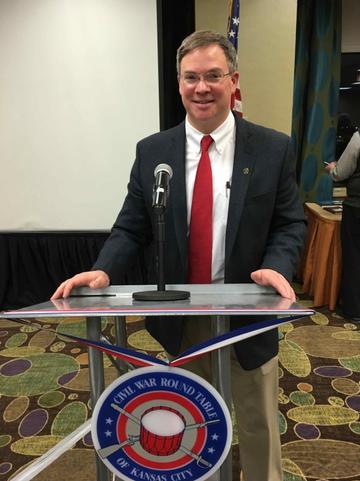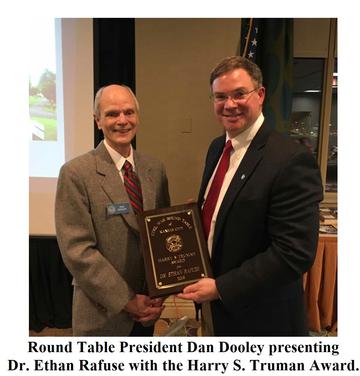December 2019

At our dinner meeting on December 17, 2019, Dr. Ethan S. Rafuse of the U.S. Army Command and General Staff College in Fort Leavenworth gave a program about Confederate General Thomas J. "Stonewall" Jackson. Total attendance at the December dinner meeting was 64. The following is a summary of Dr. Rafuse's presentation:
- Dr. Rafuse wrote a biography about Stonewall Jackson that was published in 2011. He said it is a "Cliff Notes" version of the excellent book written by Dr. Janies I. Robertson, Jr. titled: Stonewall Jackson, The Man, The Soldier, the Legend, and published in 1997. Dr. Robertson died on November 2, 2019.
- Thomas J. Jackson was bom on January 21, 1824 in Clarksburg VA. He attended the United States Military Academy at West Point from 1842-1846 and graduated 17th in his class of 56. Jackson worked hard to impress his classmates and believed: "You may be whatever you resolve to be." After graduating, he looked forward to policing the frontier. However, the Class of 1846 fought in the War with Mexico.
- As a young lieutenant in 1846-1851, Jackson served as an artillery officer. He fought in Mexico from 1846-1848, served at Fort Hamilton from 1848-1850, and served at Fort Meade from 1850-1851. During the War with Mexico, Jackson fought at Vera Cruz and Cerro Gordo and earned three medals. Captain John B. Magruder said: "If devotion, industry, talent, and gallantry are the highest qualities of a soldier, then he (Jackson) is entitled to the distinction which their possession confers."
- From 1851-1861, Jackson worked as an artillery instructor at the Virginia Military Institute (VMI). However, he was not a good teacher and he was challenged to a duel by one of his students. Jackson joined the Presbyterian Church in Lexington VA and started a Bible study.
- Jackson's first wife died during childbirth. Jackson remarried and his second wife gave birth to their first child in December of 1862. Jackson did not meet his daughter until April of 1863. Jackson took his wife on a honeymoon to Canada to visit military sites. Jackson had a great interest in military history and went to Europe to visit battlefields, including Waterloo.
- After the Civil War began, Jackson led his VMI cadets to Richmond and arrived on April 22, 1861. However, Jackson was not in favor of secession. He later commanded the Confederate troops at Harpers Ferry VA. Jackson instilled discipline and occupied Maryland Heights.
- At the First Battle of Manassas on July 21, 1861, Brig. General Bernard Bee rallied his men by pointing to Jackson's line on Henry Hill and shouting: "Look men, there is Jackson standing like a stone wall!"
- Dr. Rafuse discussed Jackson's Shenandoah Valley Campaign (November 1861 to June 1862) in detail. In summary, Jackson's force of 17,000 Confederates defeated 60,000 Federal troops.
- From June 1862 to May of 1863, Jackson served under General Robert E. Lee. Jackson didn't perform well at the Seven Days Battles because his troops were exhausted. Also the swampy conditions around Richmond were different than the Shenandoah Valley.
- Jackson performed well at Second Manassas. Jackson captured over 12,000 Federal troops at Harpers Ferry during the Antietam Campaign. At Fredericksburg, the only Union breakthrough occurred at Jackson's front.
- During the Battle of Chancellorsville VA on May 2, 1863, Jackson was instrumental in defeating the Union Army by leading his troops on a 12-mile flank march to attack the unsuspecting Union right. However, later that night, Jackson was accidentally shot by his own men. Jackson's left arm had to be amputated and he later contracted pneumonia. Jackson died at Guinea Station on May 10, 1863.
- During the question and answer period, Dr. Rafuse was asked to compare Jackson versus Lee. Dr. Rafuse said Jackson grew up poor. He made himself successful. Jackson thought you could be anything you want to be. Jackson was dedicated. He prayed all the time. He believed in personal development and expected others to do the same. Jackson was very demanding of his subordinates.
- Dr. Rafuse said General Lee was bom into his position. Lee was naturally elite. He expected non-elites to make mistakes. Lee thought people should do what is right. However, people will do things wrong. Lee could not get too upset with those people because they were not elite. Lee was conflict averse. He gave subordinates second chances.
Following Dr. Rafuse's program, Round Table president Dan Dooley presented Dr. Rafuse with the Round Table's Harry S. Truman Award in recognition of the contributions that Dr. Rafuse has made as a distinguished professor and author of Civil War military history. Dr. Rafuse said he was honored to receive the same award that his mentor, Dr. Herman Hattaway, received back in 1986. This was the sixth time that Dr. Rafuse has spoken at our Round Table dinner meetings.

|
| |